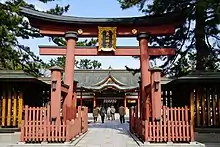Kehi Shrine
Kehi Shrine (氣比神宮, Kehi jingū) is a Shinto shrine in the city of Tsuruga, Fukui Prefecture, Japan. In the former Modern system of ranked Shinto Shrines, it was a national shrine of the 1st rank (官幣大社, Kanpei-Taisha), and the ichinomiya of Echizen Province. Its main festival is held annually on September 4. The shrine is considered the chief guardian shrine of the Hokuriku region.
| Kehi Shrine 氣比神宮 | |
|---|---|
 Nakatorii of Kehi Shrine | |
| Religion | |
| Affiliation | Shinto |
| Deity | Izasawake no mikoto |
| Festival | Reitaisai (September 4th) |
| Location | |
| Location | 11-68 Akebono-chō, Tsuruga-shi, Fukui-ken |
 Shown within Fukui Prefecture  Kehi Shrine (Japan) | |
| Geographic coordinates | 35.6550°N 136.0747°E |
| Website | |
| kehijingu | |
History
The foundation of Kehi Jingū predates written history, and it is mentioned the Nara period Kojiki and Nihon Shoki chronicles. The shrine itself lists a date of 702 AD, and is dedicated to seven kami.
The shrine was mostly destroyed in 1945, during the Bombing of Tsuruga in World War II by American forces, and its National Treasure Honden built in the Edo period by Yūki Hideyasu burned down. One surviving structure is the shrine's 11-meter-tall tore gate, which was built in 1902 and which is registered as an Important Cultural Property. It is the third largest wooden torii gates, alongside Nara’s Kasuga Taisha Shrine and Hiroshima’s Itsukushima Shrine.
In September of 1689, Kehi Jingu Shrine was visited by the famous poet Matsuo Basho, and his visit is still commemorated with a statue and a stone monument inscribed with his haiku.
Enshrined kami
- Izasawake-no-mikoto (伊奢沙別命), the semi-legendary Prince Tsunuga Arashito, who traveled from his home in Silla to Tsuruga during the reign of Emperor Sujin. According to the Nihon Shoki he had horns coming from his head; the area was named “Tsunuga,” written, literally, “horn-deer,” and over time it became “Tsuruga.”
- Emperor Chūai (仲哀天皇, Chūai-tennō), the semi-legendary 14th Emperor of Japan
- Empress consort Jingū (神功皇后, Jingū-kōgō), consort of Emperor Chūai
- Yamato Takeru (ヤマトタケルノミコト, Yamato Takeru no Mikoto)
- Tama-hime no mikoto (玉姫命), the daughter of Empress Jingū
- Emperor Ōjin (応神天皇, Ōjin-tennō), the 15th Emperor of Japan
- Takenouchi no Sukune (武内宿禰), legendary hero-statesman
See also
- List of Jingu
External links
| Wikimedia Commons has media related to Kehi-jingu. |